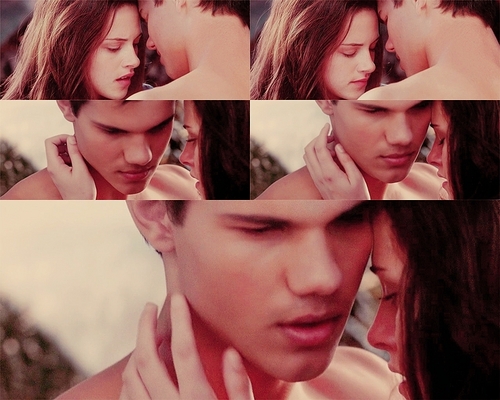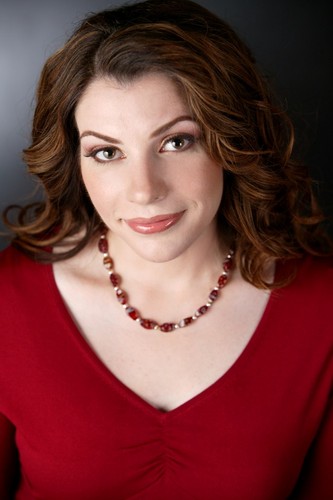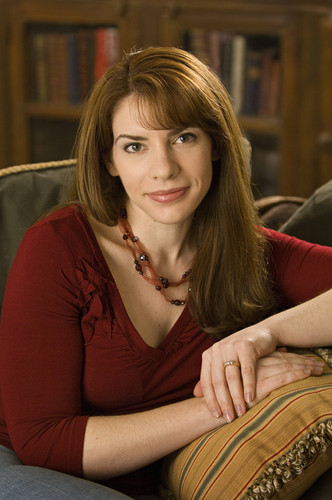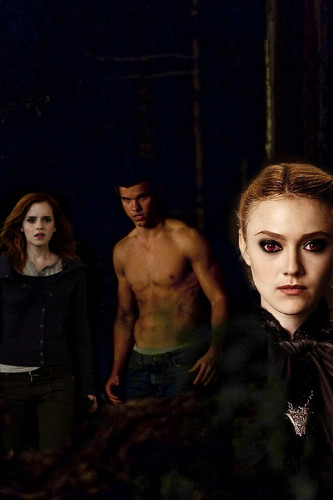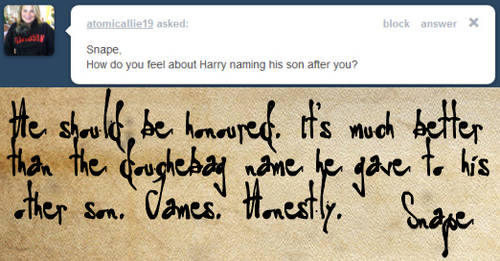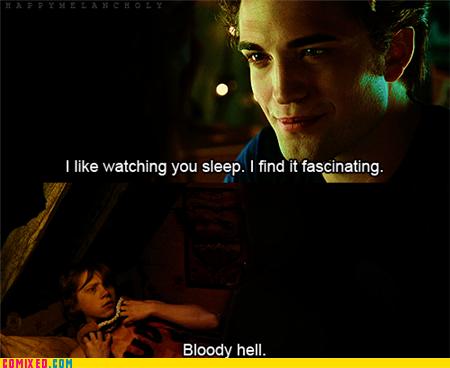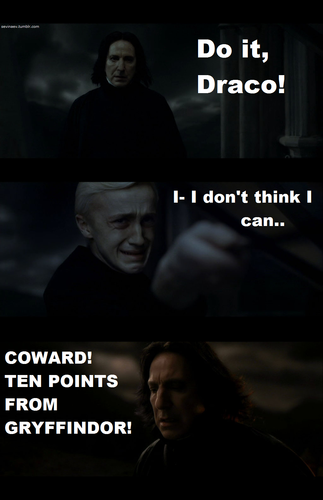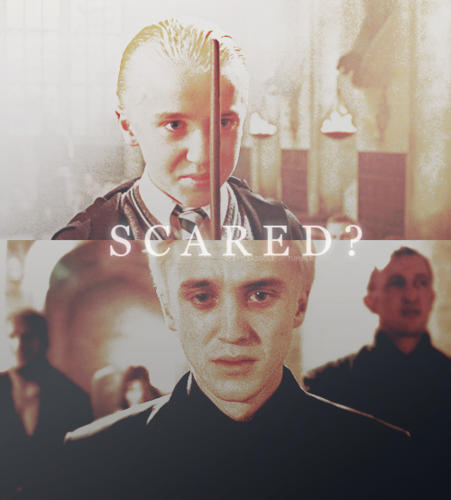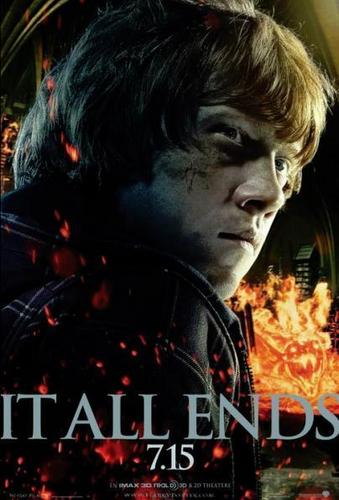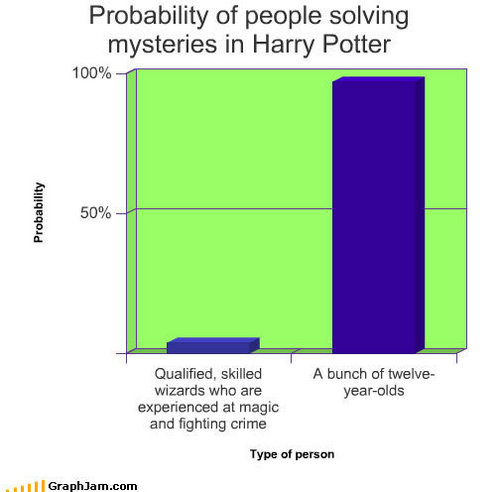well,
copied from a web-site:
Great:
Wizard-on-wizard combat in the films
Writing battle scenes was never Rowling’s strongest suit, but her fight scenes became electric on the screen, more or less literally: The effect when two thrown spells locked in mid-air is particularly splashy and creative, with the clash of energy throwing off heavy, wet detritus that looks like paint. Scenes like the Battle For Hogwarts at the end of the series, the Ministry Of Magic showdown in Order Of The Phoenix (with good and evil wizards zipping around as light and dark clouds, and the sense that more action was happening just off each of the screen’s four edges) and the Dumbledore vs. Voldemort face-off (see below) are executed with thrilling style, and even simpler confrontations like the classroom duels in Sorcerer’s Stone are packed with tension and unpredictability. Rowling’s print fights tended to rely on the same small handful of spells over and over; on the screen, combatants often dispensed with words and fought with effects.
Not-so-great:
Half-assed plot points in the movies
A movie adaptation practically never includes as much detail as the book that spawned it, and there’s nothing wrong with that—except when the movie makes efforts to cram the details in, but leaves out the connective tissue that makes them make sense. For instance, the film version of Half-Blood Prince is just as obsessed as the book with the identity of the titular mystery prince, but when Snape announces that he’s the prince, he doesn’t actually bother with the just one more sentence that would have explained what the title means. Why does Prisoner Of Azkaban take the time to have Harry slowly read off the names of the creators of the Marauder’s Map, but leave their identities a mystery, even though Harry is connected to all four and even speaks to one of them about the map? And in fact, bringing that point up would explain why he thinks the stag Patronus he sees in the forest is his father, which makes no sense otherwise. Why preserve Kreature’s hatred of everyone who enters the Black house, but not touch on who he is and why he has to serve them? Why animate the cat Patronus protecting the bench from the Dementors in Dolores Umbridge’s court, but not explain the setup, even when it becomes crucial to the action sequence that follows? Fans will get all these things but find their vagueness annoying, whereas casual watchers are just likely to be confused.
Great:
Hogwarts Castle
Hogwarts Castle is as important a character to the Potterverse as any of the wizards who inhabit it: It’s full of secrets, personality, and, well, magic. But unlike many aspects of the film series, which had some early growing pains, the Hogwarts sets were pretty much perfect from the outset. Over the course of a decade of working on the Potter films, production designer Stuart Craig oversaw the construction of thousands of sets, a good number of which were the sprawling corridors, grand halls, and creepy dungeons of Hogwarts, all rendered in a vaguely Gothic style that evokes glittering fantasy and grubby realism alike. Though its bridges, passageways, and forests were spread out over various unconnected sets, the Hogwarts of the films feels like an actual magical castle some lucky location scout stumbled across, a place fans could actually visit and explore. And in a way, they soon can: The film sets will be reconstructed as part of a permanent Potter exhibit at Leavesden Film Studios in Hertfordshire, England.
Not-so-great:
“Dumbledore is gay”
The revelation that Hogwarts’ headmaster is gay would have been absolutely fine, even intriguing, had it been implied anywhere in the text of the books. But it wasn’t. (Dumbledore’s proclivity for “flamboyant” clothing doesn’t really count, right?) Rather, J.K. Rowling dumped that little tidbit on the world at a Deathly Hallows reading after the final book was released, citing no evidence other than it’s what she “always thought,” and pointing to Dumbledore’s close friendship with notorious Dark Wizard Gellert Grindelwald as a potential romance. Rowling is well within her rights as an author to imagine extended backstory for her characters, but casually dropping a major, potentially controversial detail about one of the series’ most beloved characters at the exact moment Potter mania was at its zenith smacks of opportunistic revisionism.
Great:
“Hedwig’s Theme”
There are few aspects of the Harry Potter movies that aren’t directly stipulated by the books, but one of the purely movie-centric bits of the Potterverse has become an unforgettable piece of the franchise. The “Hedwig’s Theme” leitmotif, composed by John Williams for the first movie, has permeated every film installment in different arrangements, becoming as integral a part of the series as Hedwig herself. The theme’s twinkling melody has served as a familiar opening salvo in the trailers and films alike, invoking a Pavlovian response from super-fans dying to see what those unmistakable notes portend.
Not-so-great:
The movie Dursleys
As the Harry Potter books progress, Harry’s cartoonishly spiteful Muggle family, the Dursleys, feels more and more like a holdover from the series’ kiddie beginnings. While the books manage to progress Harry’s relationship with his Uncle Vernon, Aunt Petunia, and cousin Dudley enough that their final parting with Harry has some emotional resonance, the films never make them seem like more than shrill comedic relief killing time with funny faces and pratfalls before the real action starts. The disconnect is most egregious in Order Of The Phoenix, where the looming threat of Voldemort and escaped Dementors is offset by the Dursleys’ silly mugging. Thankfully, the Dursleys were excised from the last two films, which had more pressing matters to address than Dudley’s hilarious girth and Aunt Petunia’s ridiculous outfits.
Great:
Watching the kids and the series grow up
While it’s a fair cop to suggest that the child actors cast as the leads in the first Harry Potter movie were chosen for their looks as much as anything else—which is par for the course, given Chris Columbus’ George Lucas-like focus on special effects rather than boring ol’ flesh-and-blood actors—Daniel Radcliffe, Emma Watson, and Rupert Grint ultimately grew into talented actors who made the material their own. (To a lesser extent, so did Tom Felton and Matthew Lewis. Both were generally underserved by scripts that marginalized or removed them, but both had their moments in the spotlight.) And checking in with them every year or two to see how they’d changed and matured was fun in its own right, like meeting up with childhood acquaintances at odd intervals. In a way, the Harry Potter movies serve as a fictional take on Michael Apted’s 7 Up documentary series: Viewers actually got to watch the actors mature as the characters did, without recourse to any special effect but nature.
Not-so-great:
Dei ex machina
One of the dangers of setting a story in a magical world is that even the most suspect plot contrivances can be explained away by “Magic!” For as much as Rowling talks about how planned-out her tale was, she does exhibit a habit of bending her own rules, introducing oh-so-convenient new spells/devices or altering the abilities of previous ones to fit the situation. Hermione’s Time-Turner, the ever-reappearing Sword Of Gryffindor, Dumbledore’s Deluminator, the various unexplained magical protections Harry has against death: Chalk all these developments up to the fickle, fluctuating, mysterious nature of magic, and don’t try to resolve them with what you already know about the wizarding world. The deus ex machina isn’t an inherently bad device, nor is it productive to question the verisimilitude of fairy tales, but Rowling’s continued reliance on them undermines the otherwise-convincing world she builds throughout the books.
Great:
The movies’ casting
The young cast members aside, much of the movies’ strength came from the terrific supporting cast and their suitability for their roles—particularly Maggie Smith as Professor McGonagall, Jim Broadbent as the huffy Professor Slughorn, Robbie Coltrane as Hagrid, David Thewlis as Lupin, Gary Oldman as Sirius Black (he overplayed the crazy a bit in Prisoner Of Azkaban, but he really sold the character’s rakish carelessness and deep sadness later on) Michael Gambon as Dumbledore (stepping in without missing a beat after original Dumbledore Richard Harris died), Imelda Staunton as the treacly Umbridge, Ralph Fiennes as Ol’ Noseless You Know Who himself, and particularly Alan Rickman as Snape. The latter, above all, seemed to revel in his role, and his snappish, protracted syllables and palpable disgusted malice were a highlight of any movie where he got more than a moment of screen time.
Not-so-great:
S.P.E.W.
Fans protested practically every aspect of the books left out of the movies, but few stood up for the novels’ tone-deaf S.P.E.W. plotline, which seemingly set out to compensate for the series’ most prominent female character, Hermione Granger, being too smart and too often right. To balance out Hermione’s positive elements, Rowling sent her off on a quest no one appreciated: to free house-elves from what she saw as enforced servitude, based on her experience with one badly abused member of their tribe. Forming the organization Society for the Promotion of Elfish Welfare (even the acronym is strained), she heads off on a shrill, ignorant civil-rights campaign that ignores what the actual house-elves want. In the process, she embarrasses her friends and annoys everyone else, particularly her supposed beneficiaries. It’s a comic plotline that isn’t ever funny, and an issue plotline over a non-issue.
Great:
The Weasley twins
Fred and George Weasley began the Harry Potter series as likeable but broad comic relief, mercilessly teasing their younger brother Ron and generally terrorizing/delighting the students of Hogwarts. As the series expanded, however, the twins’ laid-back charms became a merrily flickering bit of light in an increasingly dark wizarding world. Whether they were cracking jokes about their interchangeability (“We know we’re called Gred and Forge!”), ending their matriculation at the Dolores Umbridge-controlled Hogwarts in a literal blaze of glory, or flouting the looming specter of You Know Who by selling a “constipation sensation” called “U-No-Poo” at their joke shop, Fred and George Weasley could always be counted on to lighten the mood… which made one of the brothers’ ultimate fate in the final book that much more heart-wrenching.
Not-so-great:
Unseen deaths
For every brave Dobby or noble Dumbledore who gets reverentially ushered off the wizarding plane, there’s a Lupin or Tonks receiving a cursory offscreen death. Granted, not every one of the dozen or so named characters who die can have an extended farewell, but some are killed off in such a vague, half-assed manner, it’s hard to decide whether to mourn them or wait for their surprise return: Mad-Eye Moody’s death in Deathly Hallows is addressed so perfunctorily, it seems almost like Bill Weasley is making a tasteless joke when he informs the Order, while Tonks and Lupin charge bravely into battle, only to reappear as corpses a few pages later. It makes the deaths feel more arbitrary and less meaningful, as if Rowling got a taste for blood and wanted to up the body count without doing the dirty work of actually killing her characters in a memorable way.
Great:
The heroic themes that include reckoning with doubt
It’s rare to see children’s entertainment without some form of message, even if that message is as broad as “Believe in yourself.” But Rowling’s books go further, with messages familiar to fantasy fans, but still worth repeating. And they’re executed particularly well throughout the series, as she underlines the importance of loyalty, bravery, and especially friendship. Courage under fire and determination even against unbeatable odds come up again and again in her work, often in thrilling and satisfying ways. But the deepest message of the books may be a pointed suggestion that just because society, government, and particularly the media say something doesn’t necessarily mean it’s true. By setting her good-vs.-evil battle in a world where the media and government are largely deluded pawns, and the public sees only what it wants to see, the books urge a healthy skepticism of institutions, and a spirit of inquiry and self-sufficiency rather than obedience and passive acceptance.
Not-so-great:
Moral relativity
Even as the Harry Potter books matured over time, they maintained a fairly black-and-white moral tone: Evil people might masquerade as something kinder (as Defense Against The Dark Arts teachers always seemed to), but with the exception of the tragically complicated Severus Snape, none of them ultimately revealed much complexity. Which is why it’s continually odd that as the protagonists’ situation worsens, they adopt their enemies’ habits without a second thought. When a DADA teacher first introduces them to the Unforgivable Curses, they’re shocked and horrified, but as soon as Harry really gets upset, he’s pulling out the torture curse, and by the end of the books, he’s controlling people’s minds without a qualm. Even the mild-mannered Molly Weasley is striking her enemies dead. And when, in book seven, it becomes clear that dealing openly and fairly with the goblin Griphook might get in the way of Harry’s quest to destroy Voldemort, he doesn’t once consider appealing to Griphook’s better nature, striking a deal with him, or even explaining the problem, he just sets out to cheat him as best he can. It isn’t that the heroes should never stoop to moral compromise, it’s just unsettling that they don’t stop to consider the compromise: The ends clearly justify any means. Incidentally, it’s continually interesting to see how the film versions fudge this dynamic, softening the heroes’ behavior wherever possible.
copied from a web-site:
Great:
Wizard-on-wizard combat in the films
Writing battle scenes was never Rowling’s strongest suit, but her fight scenes became electric on the screen, more or less literally: The effect when two thrown spells locked in mid-air is particularly splashy and creative, with the clash of energy throwing off heavy, wet detritus that looks like paint. Scenes like the Battle For Hogwarts at the end of the series, the Ministry Of Magic showdown in Order Of The Phoenix (with good and evil wizards zipping around as light and dark clouds, and the sense that more action was happening just off each of the screen’s four edges) and the Dumbledore vs. Voldemort face-off (see below) are executed with thrilling style, and even simpler confrontations like the classroom duels in Sorcerer’s Stone are packed with tension and unpredictability. Rowling’s print fights tended to rely on the same small handful of spells over and over; on the screen, combatants often dispensed with words and fought with effects.
Not-so-great:
Half-assed plot points in the movies
A movie adaptation practically never includes as much detail as the book that spawned it, and there’s nothing wrong with that—except when the movie makes efforts to cram the details in, but leaves out the connective tissue that makes them make sense. For instance, the film version of Half-Blood Prince is just as obsessed as the book with the identity of the titular mystery prince, but when Snape announces that he’s the prince, he doesn’t actually bother with the just one more sentence that would have explained what the title means. Why does Prisoner Of Azkaban take the time to have Harry slowly read off the names of the creators of the Marauder’s Map, but leave their identities a mystery, even though Harry is connected to all four and even speaks to one of them about the map? And in fact, bringing that point up would explain why he thinks the stag Patronus he sees in the forest is his father, which makes no sense otherwise. Why preserve Kreature’s hatred of everyone who enters the Black house, but not touch on who he is and why he has to serve them? Why animate the cat Patronus protecting the bench from the Dementors in Dolores Umbridge’s court, but not explain the setup, even when it becomes crucial to the action sequence that follows? Fans will get all these things but find their vagueness annoying, whereas casual watchers are just likely to be confused.
Great:
Hogwarts Castle
Hogwarts Castle is as important a character to the Potterverse as any of the wizards who inhabit it: It’s full of secrets, personality, and, well, magic. But unlike many aspects of the film series, which had some early growing pains, the Hogwarts sets were pretty much perfect from the outset. Over the course of a decade of working on the Potter films, production designer Stuart Craig oversaw the construction of thousands of sets, a good number of which were the sprawling corridors, grand halls, and creepy dungeons of Hogwarts, all rendered in a vaguely Gothic style that evokes glittering fantasy and grubby realism alike. Though its bridges, passageways, and forests were spread out over various unconnected sets, the Hogwarts of the films feels like an actual magical castle some lucky location scout stumbled across, a place fans could actually visit and explore. And in a way, they soon can: The film sets will be reconstructed as part of a permanent Potter exhibit at Leavesden Film Studios in Hertfordshire, England.
Not-so-great:
“Dumbledore is gay”
The revelation that Hogwarts’ headmaster is gay would have been absolutely fine, even intriguing, had it been implied anywhere in the text of the books. But it wasn’t. (Dumbledore’s proclivity for “flamboyant” clothing doesn’t really count, right?) Rather, J.K. Rowling dumped that little tidbit on the world at a Deathly Hallows reading after the final book was released, citing no evidence other than it’s what she “always thought,” and pointing to Dumbledore’s close friendship with notorious Dark Wizard Gellert Grindelwald as a potential romance. Rowling is well within her rights as an author to imagine extended backstory for her characters, but casually dropping a major, potentially controversial detail about one of the series’ most beloved characters at the exact moment Potter mania was at its zenith smacks of opportunistic revisionism.
Great:
“Hedwig’s Theme”
There are few aspects of the Harry Potter movies that aren’t directly stipulated by the books, but one of the purely movie-centric bits of the Potterverse has become an unforgettable piece of the franchise. The “Hedwig’s Theme” leitmotif, composed by John Williams for the first movie, has permeated every film installment in different arrangements, becoming as integral a part of the series as Hedwig herself. The theme’s twinkling melody has served as a familiar opening salvo in the trailers and films alike, invoking a Pavlovian response from super-fans dying to see what those unmistakable notes portend.
Not-so-great:
The movie Dursleys
As the Harry Potter books progress, Harry’s cartoonishly spiteful Muggle family, the Dursleys, feels more and more like a holdover from the series’ kiddie beginnings. While the books manage to progress Harry’s relationship with his Uncle Vernon, Aunt Petunia, and cousin Dudley enough that their final parting with Harry has some emotional resonance, the films never make them seem like more than shrill comedic relief killing time with funny faces and pratfalls before the real action starts. The disconnect is most egregious in Order Of The Phoenix, where the looming threat of Voldemort and escaped Dementors is offset by the Dursleys’ silly mugging. Thankfully, the Dursleys were excised from the last two films, which had more pressing matters to address than Dudley’s hilarious girth and Aunt Petunia’s ridiculous outfits.
Great:
Watching the kids and the series grow up
While it’s a fair cop to suggest that the child actors cast as the leads in the first Harry Potter movie were chosen for their looks as much as anything else—which is par for the course, given Chris Columbus’ George Lucas-like focus on special effects rather than boring ol’ flesh-and-blood actors—Daniel Radcliffe, Emma Watson, and Rupert Grint ultimately grew into talented actors who made the material their own. (To a lesser extent, so did Tom Felton and Matthew Lewis. Both were generally underserved by scripts that marginalized or removed them, but both had their moments in the spotlight.) And checking in with them every year or two to see how they’d changed and matured was fun in its own right, like meeting up with childhood acquaintances at odd intervals. In a way, the Harry Potter movies serve as a fictional take on Michael Apted’s 7 Up documentary series: Viewers actually got to watch the actors mature as the characters did, without recourse to any special effect but nature.
Not-so-great:
Dei ex machina
One of the dangers of setting a story in a magical world is that even the most suspect plot contrivances can be explained away by “Magic!” For as much as Rowling talks about how planned-out her tale was, she does exhibit a habit of bending her own rules, introducing oh-so-convenient new spells/devices or altering the abilities of previous ones to fit the situation. Hermione’s Time-Turner, the ever-reappearing Sword Of Gryffindor, Dumbledore’s Deluminator, the various unexplained magical protections Harry has against death: Chalk all these developments up to the fickle, fluctuating, mysterious nature of magic, and don’t try to resolve them with what you already know about the wizarding world. The deus ex machina isn’t an inherently bad device, nor is it productive to question the verisimilitude of fairy tales, but Rowling’s continued reliance on them undermines the otherwise-convincing world she builds throughout the books.
Great:
The movies’ casting
The young cast members aside, much of the movies’ strength came from the terrific supporting cast and their suitability for their roles—particularly Maggie Smith as Professor McGonagall, Jim Broadbent as the huffy Professor Slughorn, Robbie Coltrane as Hagrid, David Thewlis as Lupin, Gary Oldman as Sirius Black (he overplayed the crazy a bit in Prisoner Of Azkaban, but he really sold the character’s rakish carelessness and deep sadness later on) Michael Gambon as Dumbledore (stepping in without missing a beat after original Dumbledore Richard Harris died), Imelda Staunton as the treacly Umbridge, Ralph Fiennes as Ol’ Noseless You Know Who himself, and particularly Alan Rickman as Snape. The latter, above all, seemed to revel in his role, and his snappish, protracted syllables and palpable disgusted malice were a highlight of any movie where he got more than a moment of screen time.
Not-so-great:
S.P.E.W.
Fans protested practically every aspect of the books left out of the movies, but few stood up for the novels’ tone-deaf S.P.E.W. plotline, which seemingly set out to compensate for the series’ most prominent female character, Hermione Granger, being too smart and too often right. To balance out Hermione’s positive elements, Rowling sent her off on a quest no one appreciated: to free house-elves from what she saw as enforced servitude, based on her experience with one badly abused member of their tribe. Forming the organization Society for the Promotion of Elfish Welfare (even the acronym is strained), she heads off on a shrill, ignorant civil-rights campaign that ignores what the actual house-elves want. In the process, she embarrasses her friends and annoys everyone else, particularly her supposed beneficiaries. It’s a comic plotline that isn’t ever funny, and an issue plotline over a non-issue.
Great:
The Weasley twins
Fred and George Weasley began the Harry Potter series as likeable but broad comic relief, mercilessly teasing their younger brother Ron and generally terrorizing/delighting the students of Hogwarts. As the series expanded, however, the twins’ laid-back charms became a merrily flickering bit of light in an increasingly dark wizarding world. Whether they were cracking jokes about their interchangeability (“We know we’re called Gred and Forge!”), ending their matriculation at the Dolores Umbridge-controlled Hogwarts in a literal blaze of glory, or flouting the looming specter of You Know Who by selling a “constipation sensation” called “U-No-Poo” at their joke shop, Fred and George Weasley could always be counted on to lighten the mood… which made one of the brothers’ ultimate fate in the final book that much more heart-wrenching.
Not-so-great:
Unseen deaths
For every brave Dobby or noble Dumbledore who gets reverentially ushered off the wizarding plane, there’s a Lupin or Tonks receiving a cursory offscreen death. Granted, not every one of the dozen or so named characters who die can have an extended farewell, but some are killed off in such a vague, half-assed manner, it’s hard to decide whether to mourn them or wait for their surprise return: Mad-Eye Moody’s death in Deathly Hallows is addressed so perfunctorily, it seems almost like Bill Weasley is making a tasteless joke when he informs the Order, while Tonks and Lupin charge bravely into battle, only to reappear as corpses a few pages later. It makes the deaths feel more arbitrary and less meaningful, as if Rowling got a taste for blood and wanted to up the body count without doing the dirty work of actually killing her characters in a memorable way.
Great:
The heroic themes that include reckoning with doubt
It’s rare to see children’s entertainment without some form of message, even if that message is as broad as “Believe in yourself.” But Rowling’s books go further, with messages familiar to fantasy fans, but still worth repeating. And they’re executed particularly well throughout the series, as she underlines the importance of loyalty, bravery, and especially friendship. Courage under fire and determination even against unbeatable odds come up again and again in her work, often in thrilling and satisfying ways. But the deepest message of the books may be a pointed suggestion that just because society, government, and particularly the media say something doesn’t necessarily mean it’s true. By setting her good-vs.-evil battle in a world where the media and government are largely deluded pawns, and the public sees only what it wants to see, the books urge a healthy skepticism of institutions, and a spirit of inquiry and self-sufficiency rather than obedience and passive acceptance.
Not-so-great:
Moral relativity
Even as the Harry Potter books matured over time, they maintained a fairly black-and-white moral tone: Evil people might masquerade as something kinder (as Defense Against The Dark Arts teachers always seemed to), but with the exception of the tragically complicated Severus Snape, none of them ultimately revealed much complexity. Which is why it’s continually odd that as the protagonists’ situation worsens, they adopt their enemies’ habits without a second thought. When a DADA teacher first introduces them to the Unforgivable Curses, they’re shocked and horrified, but as soon as Harry really gets upset, he’s pulling out the torture curse, and by the end of the books, he’s controlling people’s minds without a qualm. Even the mild-mannered Molly Weasley is striking her enemies dead. And when, in book seven, it becomes clear that dealing openly and fairly with the goblin Griphook might get in the way of Harry’s quest to destroy Voldemort, he doesn’t once consider appealing to Griphook’s better nature, striking a deal with him, or even explaining the problem, he just sets out to cheat him as best he can. It isn’t that the heroes should never stoop to moral compromise, it’s just unsettling that they don’t stop to consider the compromise: The ends clearly justify any means. Incidentally, it’s continually interesting to see how the film versions fudge this dynamic, softening the heroes’ behavior wherever possible.





